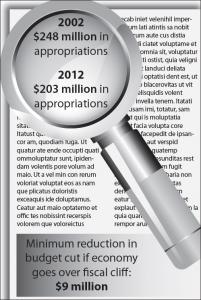Fiscal cliff sparks economic concerns

December 2, 2012
Many Americans’ financial situations could become harder by the end of the year.
Democrats and Republicans may have to work together to prevent the economy from going over the metaphorical fiscal cliff, which could send the country back into another recession if not handled. Although the possible economic downfall’s effects are uncertain, some SIU leaders and students are worried about what economic problems the possible crisis could lead to within the university community.
The fiscal cliff is reached by spending too much money and not making enough back through taxes and other means of revenue, said Scott Gilbert, director of undergraduate studies in the economics department. Gilbert said the economy risks falling off the cliff if the country continues to spend more than it makes.
Advertisement
University budget
While the prospect of another recession would affect citizens nationwide, the possibility is also a concern for SIU President Glenn Poshard. As the university already faces economic woes because of state budget issues, the possibility of further spending reductions, particularly for higher education, could hurt SIU’s budget.
Poshard said the university could suffer if the economy goes over the fiscal cliff.
“We don’t know how that’s going to affect SIU in terms of research and student aid and that sort of thing yet, but we’re thinking (there will be) a minimum of $9 million in cuts,” he said.
If taxes are increased, he said, families will have less money to take home. He said this will affect students from middle to lower income families who attend the university.
Poshard said there is no set plan for the university to deal with the economy if it goes over the fiscal cliff, because it is unclear in what ways it would affect the university at this time.
The Cliff
Advertisement*
The division between the Democrats and Republicans has caused little action to be taken on the fiscal problem.
“We come back from the election; we want to get the fiscal cliff resolved,” Rep. Lee Terry, a Republican representative for Nebraska, told CNN. “But yet we aren’t seeing anything from the White House.”
Though the government is still at a crossroads on how to deal with the financial situation, ideas have been presented.
The White House laid out plans Thursday to generate $1.6 trillion in revenue, which would involve removing tax cuts to upper-income citizens. The plan would add $50 billion for a stimulus program and expand the nation’s debt limit.
However, the Republican Party refused the proposal because they said they are against tax increases and raising the debt ceiling.
Republicans in the House of Representatives presented a counter-offer to the president’s plan Monday, which would result in $2.2 trillion in deficit savings over the next decade and would not include higher tax rates for the wealthy. This would include $800 billion from tax reform, $600 billion from Medicare and additional health care savings, and $600 billion in other spending cuts.
Though it is still unclear what action the government will take, Gilbert said the president’s proposed plan appears to be a viable option.
“(Obama’s proposed plan) can make sense,” he said. “It’s about who has to pay, and most of the people in this country aren’t too rich, so they are perfectly happy to have the rich pay a bit more not just in dollars … but in percent.”
Student Input
The looming fiscal cliff may also worry some students about what their financial futures entail.
Jake Minol, a graduate student in business administration from Alto Pass, said he thinks this is a test to see if Democrats and Republicans can work together in a crisis. He said he would blame both parties if the economy goes over the fiscal cliff.
“I don’t think with as complicated as the cliff and the cuts are, I don’t think you could blame one side over another because, at this point in time, it’s not an all or nothing proposition,” he said. “There’s so many different pieces in play.”
Minol said he would support taxes if they are needed to save the economy.
“If the choices are more taxes or our entire country goes into a nose dive, I’m for more taxes,” he said.
Minol said he knows it is easier to increase taxes but thinks it would hurt some people financially to raise them even if the goal is to improve the country’s economy.
Morgan Brown, a senior from Divernon studying zoology, said she does not think the government can stop the economy from going over the fiscal cliff.
Brown said changes in the government are needed to match the changing times. She said the two sides need to work together and could use some competition from a third party.
“I really don’t think we need the two separate political parties,” Brown said. “I think it needs to go back to just making new parties altogether because right now they keep butting heads, and then we are not going anywhere.”
Advertisement








